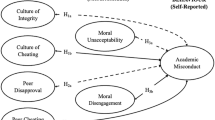Abstract
This article commences with an explanation of some of the technical terms in the field of conflict resolution. It then examines the common ways which parties to a conflict use in an effort to deal with it and concludes that, on a number of criteria, collaborative conflict resolution is the superior method. Using some representative examples of conflicts, estimates are made of the direct and indirect costs of typical conflicts in South African universities. Given the magnitude of these costs, a conflict resolution and mediation service is proposed to build a culture of resolving conflict in each university. A cost benefit analysis demonstrates that the benefits of such a service—which result from reduced duration of conflicts and reduced likelihood of escalation of conflicts to more expensive levels—may be three times greater than its costs, making it a highly desirable investment for universities to undertake.
Similar content being viewed by others
References
Adams, F. (2006). Managerialism and higher education governance: implications for South African universities? South African Journal of Higher Education, 20(1), 3–14.
Astor, H. (2005). Improving dispute resolution in Australian universities: Options for the future. Journal of Higher Education Policy & Management, 27(1), 49–65.
Bendeman, H. (2006). An analysis of the problems of the labour dispute resolution system in South Africa. African Journal of Conflict Resolution, 6(1), 81–112.
Constantino, C., & Merchant, C. (1996). Designing conflict management systems: A guide to creating productive and healthy organizations. San Francisco: Jossey Bass.
Dee, J., Henkin, A., & Holman, F. (2004). Reconciling differences: Conflict management strategies of catholic college and university presidents. Higher Education, 47(2), 177–196.
Duncan, J., (2007). The rise of the disciplinary university. The Harold Wolpe Lecture presented at the University of KwaZulu-Natal, 17 May. Accessible at http://www.fxi.org.za/index.php?option=com_content&task=view&id=85&Itemid=1.
Johnson, B. (2006). South African academia in crisis: The spread of ‘contrived collegial managerialism’. South African Journal of Higher Education, 20(1), 56–69.
Society of Professionals in Dispute Resolution (SPIDR) and Institute of Conflict Resolution. (2001). Designing integrated conflict management systems. Cornell Studies in Conflict and Dispute Resolution Report No. 4. Ithaca: Cornell University Press.
Ury, W., Brett, J., & Goldberg, S. (1988). Getting disputes resolved: Designing systems to cut the costs of conflict. San Francisco: Jossey Bass.
Waters, B. (2006). Observations/summary concerning the Management and Related Issues Task Team, letter to the Deputy Vice Chancellor—Administration & Corporate Governance, University of KwaZulu-Natal, 19 June.
West, P. (2006). Conflict in higher education and its resolution. Higher Education Quarterly, 60(2), 187–197.
Author information
Authors and Affiliations
Corresponding author
Rights and permissions
About this article
Cite this article
Harris, G. ‘If your only tool is a hammer, any issue will look like a nail’: building conflict resolution and mediation capacity in South African universities. High Educ 55, 93–101 (2008). https://doi.org/10.1007/s10734-007-9075-3
Received:
Accepted:
Published:
Issue Date:
DOI: https://doi.org/10.1007/s10734-007-9075-3




